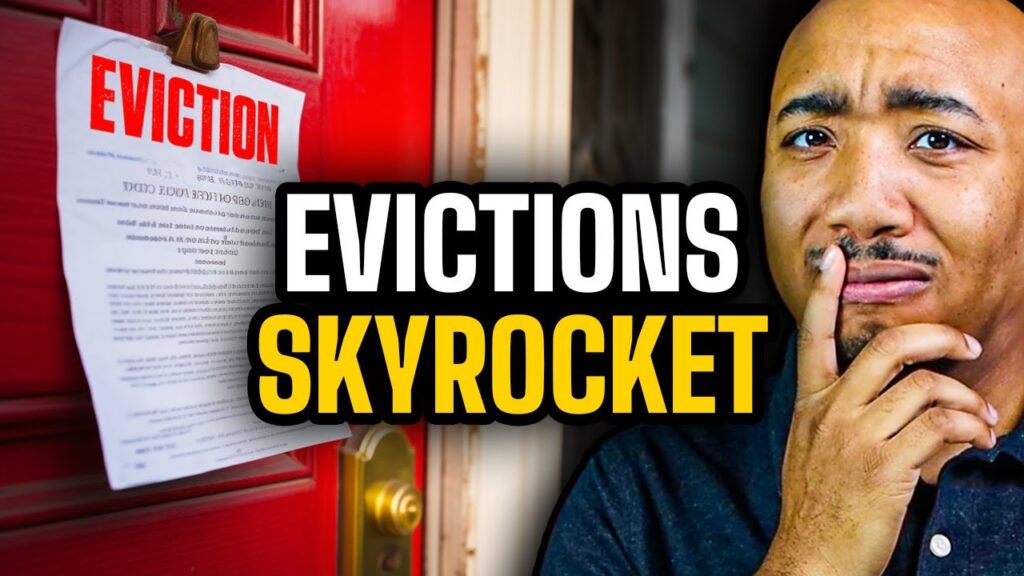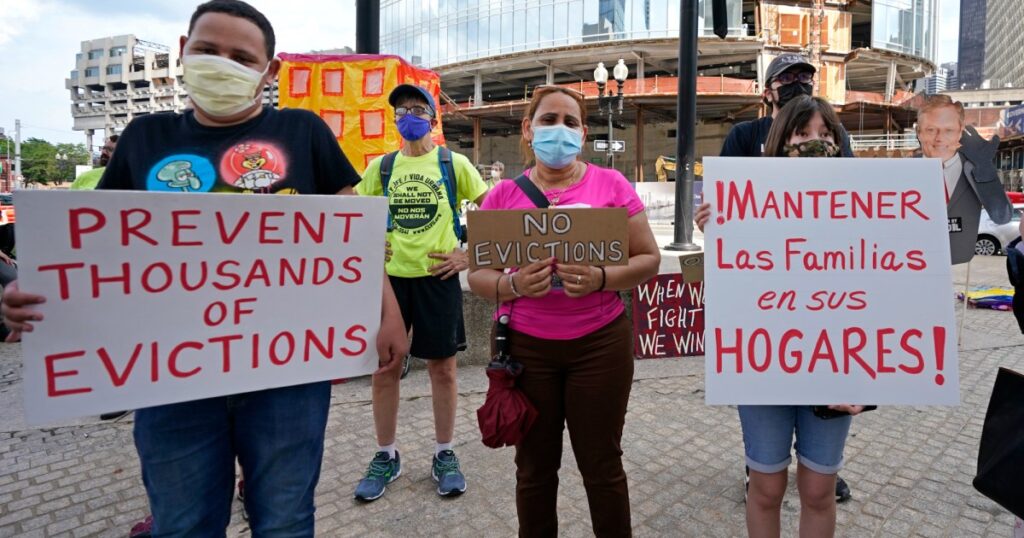Evictions Are SKYROCKETING Beyond Pre Pandemic Levels
You’re in for a shock as evictions in certain cities across the U.S. are skyrocketing beyond pre-pandemic levels. This surge is impacting the U.S. housing market in terms of housing options, inventory, and homelessness, especially hitting low-income individuals the hardest. With eviction moratoriums expiring and rent prices climbing significantly since the pandemic, cities are seeing up to a 50% increase in eviction filings, leading to a record number of evictions in places like Texas.
Despite efforts like the eviction diversion program in Philadelphia and government interventions, the issue of rising evictions and homelessness remains a pressing concern. Lessons from the 2008 financial crisis are being revisited as the manipulation of the housing market through eviction moratoriums and mortgage forbearance poses a significant economic challenge ahead. With rent costs up by 30% since 2019, finding affordable housing is becoming increasingly difficult for those facing evictions, highlighting the urgent need for solutions to this pressing issue.

Evictions Surpassing Pre-Pandemic Levels
Eviction rates are escalating beyond pre-pandemic levels in various cities across the U.S., indicating a concerning trend in the housing market. The surge in evictions is creating a ripple effect that impacts not only individuals facing homelessness but also the overall housing inventory and options available for prospective buyers and tenants. The impact of these evictions extends far beyond the immediate consequences and poses a significant challenge to the stability of the housing market.
Evictions on the Rise in U.S. Cities
The upward trajectory of eviction rates in U.S. cities is a cause for alarm, as it signifies a growing problem within the housing sector. The prevalence of evictions indicates underlying issues that need to be addressed, such as housing affordability and stability for vulnerable populations.
Eviction Filings Up 50% in Some Cities
In certain cities, eviction filings have increased by up to 50% compared to pre-pandemic levels, highlighting the severity of the housing crisis facing many individuals and families. The sharp rise in eviction filings underscores the urgent need for solutions to prevent further displacement and hardship among vulnerable populations.
Record Number of Evictions in Texas
Texas has reported a record number of evictions, up 56% beyond pre-pandemic levels, illustrating the magnitude of the housing crisis gripping the state. The influx of eviction cases in Texas underscores the need for targeted interventions and support for individuals at risk of homelessness.
Impact on Housing Market
The surge in evictions is having a profound impact on the housing market, leading to diminished housing options, increased homelessness, and soaring rent prices since the onset of the pandemic. These trends are reshaping the landscape of the housing market and posing challenges for both buyers and renters.
Housing Options Diminishing
As eviction rates rise, housing options are diminishing for individuals and families facing displacement. The shortage of affordable housing options exacerbates the housing crisis and underscores the need for sustainable solutions to address the growing demand for housing.
Increase in Homelessness
The surge in evictions has contributed to a rise in homelessness, creating a pressing need for supportive services and resources for individuals without stable housing. The increasing homelessness rates underscore the urgency of addressing the root causes of eviction and housing insecurity.
Rent Prices Soaring Since Pandemic
Rental prices have seen a significant increase since the pandemic, making it challenging for individuals affected by evictions to find affordable housing options. The escalation of rent prices further compounds the housing crisis and highlights the need for interventions to stabilize rental markets and support vulnerable populations.
Disproportionate Impact on Low-Income Individuals
Low-income individuals are disproportionately affected by rising eviction rates, struggling to find affordable housing options as rent costs continue to soar. The disparity in housing affordability poses a significant barrier to housing security and highlights the need for targeted interventions to support marginalized communities.
Struggling to Find Affordable Housing
Low-income individuals face challenges in finding affordable housing options, as rent costs escalate beyond their means. The lack of affordable housing options exacerbates housing insecurity and highlights the need for comprehensive solutions to address housing affordability issues.
Rent Costs 30% Higher Than in 2019
Rent costs have surged by 30% since 2019, making it increasingly difficult for low-income individuals to secure stable housing. The sharp increase in rent prices further compounds the challenges faced by vulnerable populations and underscores the importance of affordable housing initiatives.
Reasons for Rising Evictions
The expiration of eviction moratoriums and manipulation of the housing market through moratoriums have contributed to the surge in eviction rates, creating a complex web of challenges for individuals and families facing displacement.
Expiration of Eviction Moratoriums
The expiration of eviction moratoriums has paved the way for a sharp increase in eviction rates, leaving many individuals vulnerable to displacement and housing insecurity. The removal of these protective measures has exposed the underlying issues within the housing market and underscored the importance of addressing housing affordability.
Manipulation of Housing Market Through Moratoriums
The manipulation of the housing market through moratoriums has created a false sense of security for tenants, leading to significant challenges once the moratoriums are lifted. The unintended consequences of these interventions highlight the need for sustainable policies to address housing stability and prevent mass evictions.

Eviction Lab Data
Data from Eviction Lab reveals a significant increase in eviction filings, with a 78.6% rise compared to the previous year. The surge in eviction filings points to a growing crisis in housing insecurity and highlights the need for targeted interventions and support for individuals facing eviction.
Significant Increase in Eviction Filings
The significant increase in eviction filings tracked by Eviction Lab underscores the severity of the housing crisis unfolding in major cities across the U.S. The data reveals a troubling trend that requires immediate attention and proactive solutions to prevent further displacement.
78.6% Increase Compared to 2021
The 78.6% increase in eviction filings compared to the previous year highlights the rapid escalation of eviction rates and the urgency of addressing the root causes of housing insecurity. The staggering rise in eviction filings signals a looming crisis that requires comprehensive strategies to support individuals and families at risk of displacement.
Homelessness Crisis
The increase in homelessness resulting from evictions poses a significant challenge for communities across the U.S., necessitating targeted interventions and support for individuals without stable housing. The mounting homelessness crisis underscores the need for collaborative efforts to address housing insecurity and prevent further displacement.
Increase in Homelessness Due to Evictions
The surge in evictions has led to a corresponding increase in homelessness, creating a pressing need for emergency shelter, supportive services, and resources for individuals experiencing housing instability. The rise in homelessness underscores the urgency of addressing the underlying causes of eviction and housing insecurity.
Eviction Diversion Program in Philadelphia
Philadelphia has implemented an eviction diversion program to provide support and resources for individuals facing eviction, aiming to prevent homelessness and stabilize housing for vulnerable populations. The program serves as a model for proactive interventions to address eviction rates and support individuals at risk of displacement.

Lessons from 2008 Financial Crisis
Government interventions to prevent evictions and stabilize the housing market can provide valuable lessons from the 2008 financial crisis. By implementing targeted policies and support programs, policymakers can mitigate the impact of rising eviction rates and prevent widespread displacement.
Impact of Rising Costs and Inflation
Challenges in selling and renting properties, warning about economic challenges ahead, and market manipulation through technology in repossessing vehicles and rising auto loan delinquencies highlight the complexities of the housing market and the need for comprehensive strategies to address housing affordability and stability. These trends underscore the importance of proactive interventions to support individuals and families facing housing insecurity.



